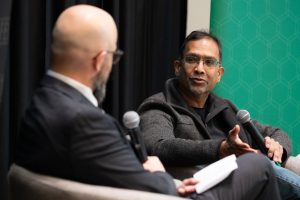In this Behind the Headlines podcast episode, OBJ publisher Michael Curran speaks with OBJ editors David Sali and Peter Kovessy about some of the week’s biggest local business stories.
This is an edited transcript of the panel discussion. To hear the full interview, please watch the video above. Prefer an audio version of this podcast? Listen to it on SoundCloud or Spotify.
(Sponsored)

Desjardins Elevator Pitch Competition drives entrepreneurial energy at uOttawa
In uOttawa’s Desjardins Elevator Pitch Competition, a single team member stands before the judges, pitching for three minutes, fielding questions for five. There are no decks, notes, props or prototypes

Advertising or posting a job opportunity is about to get more complicated for many local organizations with 25 or more employees. That’s because of a slew of updates to Ontario’s
CURRAN: We’re going to start off with one of the hottest debates right now: the need for physical office space. Dave, you sat in on a recent chat between two experts about this topic. What were they saying?
SALI: The Ottawa chapter of the Financial Executives International Canada had an interesting online discussion about the future of office space and the increased need for flexibility. This has led to a lot of experimentation, with more people enjoying the freedom of working from home. One idea that came up in discussion about the future of offices is the hub-and-spoke model, where companies would have satellite offices so not everyone has to gather at one central location. This could mean smaller groups get to collaborate and come up with new ideas for the business, which could be a really significant shift in everyday operations. While not everyone agreed on this approach, it could still be a viable option for some looking for more flexibility.
CURRAN: There is a Cornwall hydroponics company that is doing business with a local grocery store. Peter, tell us about this.
KOVESSY: An indoor farming startup called Fiedless Farms had a breakthrough recently when it signed a deal with Farm Boy to stock more than 20 locations with the company’s homegrown product. There are two really exciting things to consider with this company: the market opportunity and the ambition of the executives. Every year the country imports billions of dollars in fresh produce, and with more talk of shortening supply chains, there is definitely a local opportunity there. The company also recently secured more private capital to fund its growth and the CEO is adamant about expanding the company’s products and scaling up its number of growing facilities.
CURRAN: Our last story is of course rapidly evolving as the government continues to review COVID-19 restrictions. Dave and Peter, what are we hearing on an employment front and how are those hardest hit adapting?
KOVESSY: The latest unemployment figures show the number of people working in Ottawa-Gatineau hit its highest level since the pandemic began, which is encouraging. The unemployment rate is still stubbornly high, but with more restrictions expected for bars and restaurants, we are entering this new period with modest employment strength.
SALI: Speaking with restaurateurs, they were saying they could live with the balance the province had in place with the number of people allowed inside and at tables, however with the possibility of returning to Stage 2 restrictions, this will have a significant impact on smaller businesses who were already barely hanging on.


